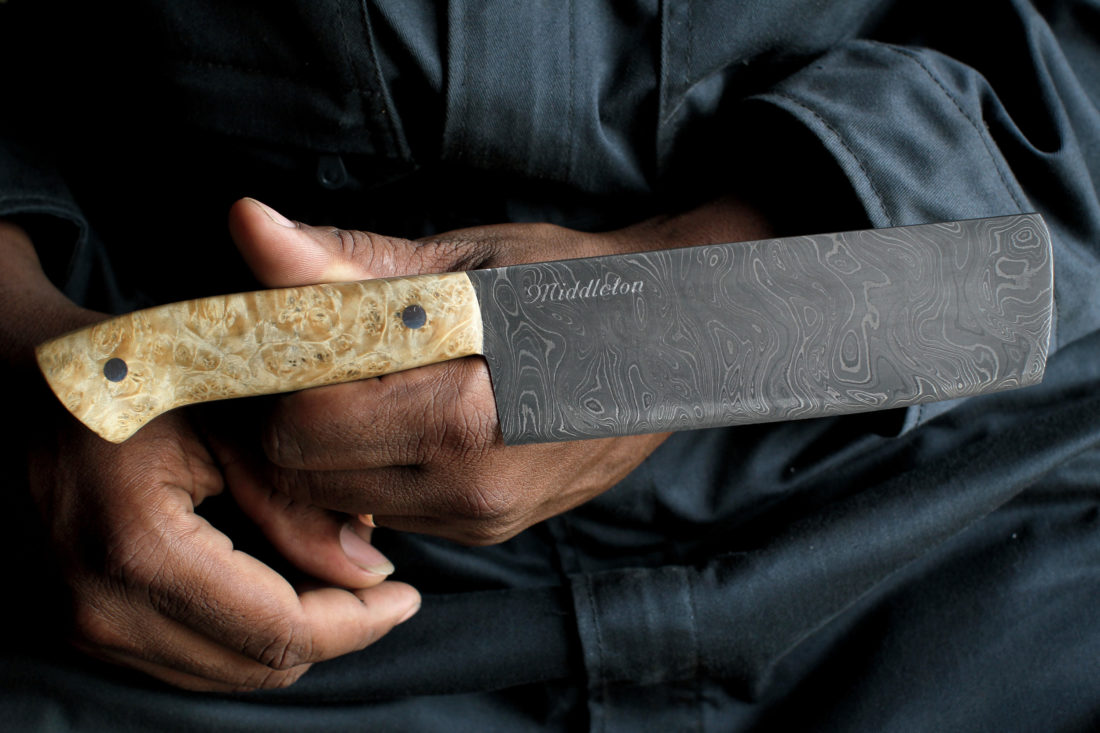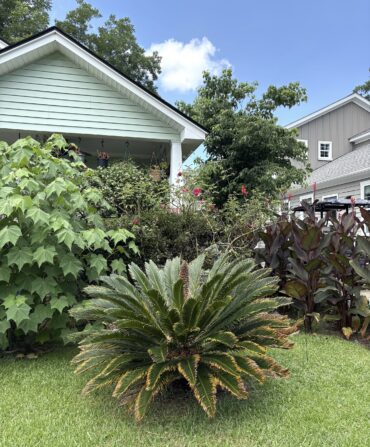Quintin Middleton’s shed, made of plywood and two-by-fours, stands just a couple of hundred feet from his house. On the three days a week when the twenty-six-year-old is not fixing signs on Highway 52 or chipping downed gum trees as handyman for the town of St. Stephen, South Carolina, he’s creating art in the simple outbuilding. Rising at dawn, he wrangles well-worn tools: square-faced hammers, grinders, saws, a rust-spotted anvil, a propane-fired forge. When the metal glows, Middleton, a thickset man with calm eyes, beats a crude block of steel into a one-of-a- kind handmade kitchen knife. “Sweetgrass baskets aren’t the only thing made in Charleston,” he likes to say.
Others state it more strongly. “What he creates out of that little building is just insane,” says the founder of an underground supper club in Charleston called Guerrilla Cuisine who is known as jimihatt. He used a Middleton knife to compete in, and ultimately win, the 2010 Charleston Wine + Food Festival Chefs Challenge.
Middleton Made Knives opened for business in March 2010, and the company has already attracted fans around the country, including Food Network star Claire Robinson and the executive pastry chef at Manhattan’s Jean Georges, Johnny Iuzzini. The company sells five standard styles, plus a Japanese Santoku style, with prices ranging from $80 for a paring knife with a cherry handle to $650 for a bespoke high-carbon-steel chef’s knife, for which the customer can specify the rocker of the blade and the shape of the handle. Middleton is obsessive about quality and has been known to toss a knife he’s been working on for hours if he discovers even the tiniest crack in the blade during final sharpening. “Passion creates quality,” he says.

Photo: Joshua Drake
Creative Spark
A knife in progress.
That dedication has always been there. Middleton first tried his hand at making a blade at age eight, when, inspired by the opening “secret of steel” monologue in the film Conan the Barbarian, he used a claw hammer and a cinder-block anvil to flatten a shower rod into a mighty sword. Later he expected to enter the army, like his grandfather and older brothers. But instead, Middleton found himself on a path to more peaceful vocations, at times working as an aircraft mechanic and industrial mechanic. At age nineteen, when he was working at a cigar and cutlery shop, he happened to meet Jason Knight, one of just a handful of commercially successful master bladesmiths in the world and a South Carolinian. “I was actually with another knife maker from Taiwan,” Knight remembers. “But Quintin was just so nice, so easy to talk to.” The two struck up a mentorship—which was actually more like an ongoing taunt. Middleton interrogated his hero relentlessly; Knight insisted that Middleton, like most bladesmiths, learn through trial and error. As Middleton’s know-how increased, he began asking local chefs for design advice and altering his styles according to their expert recommendations, flattening the blade’s back edge to provide a longer cutting surface, rounding the top of the grip to minimize blistering. Seven years after meeting Knight, Middleton launched Middleton Made Knives. “It took him a while,” Knight says, “but then he knocked it out of the park.”

Nowadays, Middleton focuses on smithing—perfectly forging, profiling, heat treating, and tempering each blade—catching up on a backlog of orders, and searching for ever-better materials. For his stainless steel knives, the current front-runner is an expensive Swedish import with a fine molecular structure called Sandvik 13C26, which is most often used in shaving razors. While Middleton certainly wouldn’t mind making a mint, he’s in no hurry. “When I sell a knife, it’s not just a business transaction,” he says. “We’re becoming friends. You’re becoming part of the Middleton family.”









